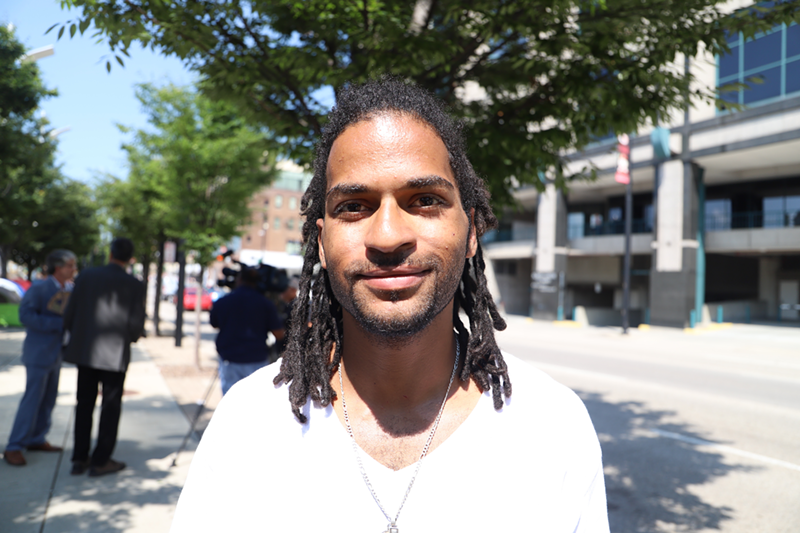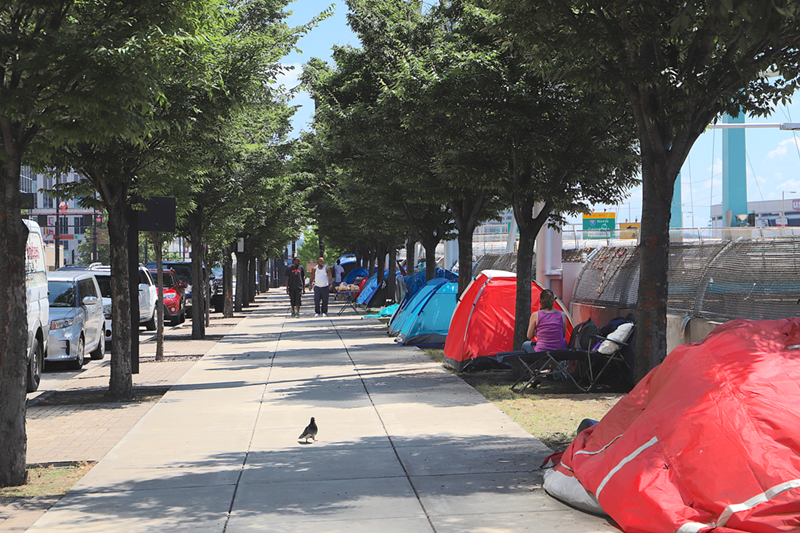For the last few months, Joe Phillips has been living in a tent alongside Third Street in downtown Cincinnati. It’s just the latest place he’s settled in a long-running search for stability.
Phillips is the named plaintiff in a federal lawsuit filed today against the city by inhabitants of the roughly 40-person tent city on Third Street, a camp in the shadow of Cincinnati’s sports stadiums on one side and the headquarters of some of its large corporations on the other.
The lawsuit, filed with the help of the Greater Cincinnati Homeless Coalition and Cook & Logothetis law firm, sought to block the impending removal of the camp at 2 p.m. today (Aug. 3). But a federal judge refused to grant a temporary restraining order that would have stopped the removal.
Instead, the camp was cleared for about two hours while the city cleaed the area. Inhabitants were not restricted from returning after that, and by about 4:30, a dozen or so tents were back up at the site.
That is temporary, Mayor John Cranley says.
“It is unacceptable that individuals and activists continue to illegally camp with tents in the right-of-way," Cranley said in a statement. "This presents a clear and present health and safety hazard to homeless individuals and the general public. The city is working hard to end this. This afternoon, I also asked for and have obtained the assistance of Hamilton County Prosecutor Joe Deters. Prosecutor Deters will be filing actions in state court and we will file motions in federal court. I thank Prosecutor Deters for his help in this matter. Together we will continue to pursue all strategies to end this unsafe practice. I ask for patience as we pursued appropriate court orders.”
Deters has indicated he will file public nuisance charges against those living in the downtown camps, making them subject to arrest.
According to Phillips, others in the camp and their advocates, there are deep, complex issues that need to be addressed if the city really wants to help people get off the streets. Affordable homes, access to mental healthcare, addiction treatment, securing more good paying jobs and other measures need to be taken instead of simply removing tent cities as they pop up.
“We just need as much help as we can get,” Phillips says. “Me personally, and I can speak for a lot of others here, we’re not looking for handouts. One big issue is mental health, depression issues, just feeling alone.”
Homeless Coalition Director Josh Spring says the city’s practice of clearing camps violates constitutional protections for free speech and free movement and against unlawful search and seizure. The space where the camps exist is public property, Spring points out, and people shouldn’t simply be removed from those spaces
“People have a human right to speak and to be seen,” Spring says. “You can’t get any more seen than right here on Third Street. People are here because they have no other place to be and they have chosen this location because other people can see. It provides safety and an opportunity to tell the public what the problem is.”
Third Street, which residents call "The Colony," would have been the second camp cleared by the city in the past two weeks. Another camp a few blocks to the east is also slated for removal starting next week.
The city says the camp and another one nearby pose public health and safety risks, the same reasons it gave for clearing the camp further down Third Street under an overpass carrying Fort Washington Way. Mayor Cranley has specifically cited what he says have been recent hepatitis outbreaks in the area. He acknowledges the city can’t prove the rise in cases came from the camp, but says conditions there often cause such outbreaks.
"As in the previous camp, there were syringes and public urination and defecation, and this is an unacceptable living environment for the people down there," Cranley said.
Downtown residents and businesses have lodged complaints about the camps, saying they've witnessed drug use, public sex and other acts at the sites. The camp's defenders deny this, however.
Advocates, including Spring, acknowledge that homelessness is a public health concern — at least 100 people have died while experiencing homelessness in the last year — but says the mayor has no proof that there has been a hepatitis outbreak or that it is centered around the camp.
“Even if there was a hepatitis outbreak,” Spring says, “is the proper response to say, ‘Get away from us?’ Is that what we do as a city?”

Activists and inhabitants of the camp say a removal would simply scatter the camp’s inhabitants to other locations and wouldn’t address any of the region’s looming affordable housing problems. A study released last year by the Local Initiatives Support Corporation found Hamilton County needs about 40,000 more units of affordable housing to meet demands from low-income families. Currently, only about 16,000 units of low-income housing exist in the county.
The city and social service nonprofits have provided some services, including a jobs van provided by the GeneroCity 513 program that pays workers experiencing homelessness $45 a day to clean up litter. There is also work to find more space for camp inhabitants in area shelters. But many shelters are over capacity, advocates say — the men’s shelter on Gest Street in Queensgate is 130 percent full and a women’s shelter in Mount Auburn has 78 people staying in its 60-bed facility.
Strategies to End Homelessness, the nonprofit that coordinates many shelter options, says there were roughly 7,100 people experiencing homelessness in Hamilton County in 2016.
Phillips, 30, says the camp is a rare place of respite and stability in a long stretch of instability for him. He lost his spot in a shelter after missing its 9 p.m. curfew multiple nights in a row earlier this year — the first time because he was working in the suburbs, he says, and didn't make it back in time. He's been couch surfing, staying in motels and sleeping on the streets since he was 17, when he got out of foster care.
“Safety is one reason I’m here,” he says. “It’s very brightly lit here and there are a lot of eyes and ears here. Everyone looks out for each other, so I’m able to have the luxury to take weight off my shoulders, so I don’t have to always be hindered with my whole life on my back.”


